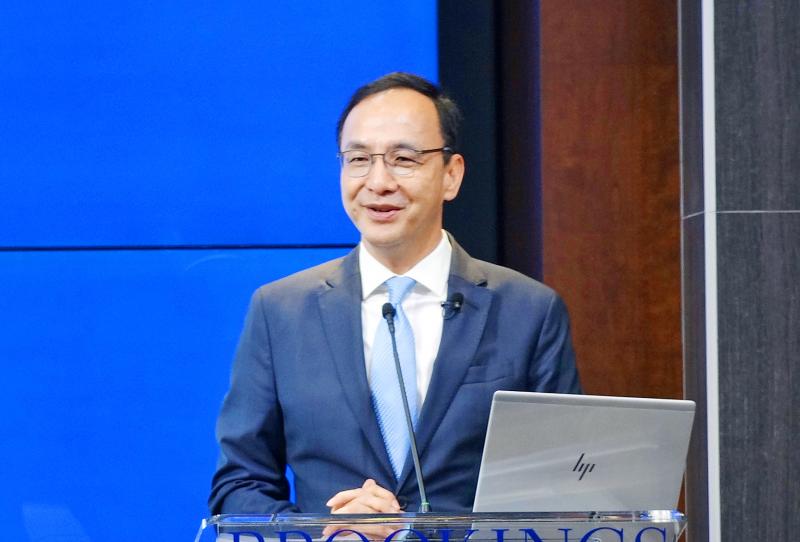Chinese Nationalist Party (KMT) Chairman Eric Chu (朱立倫) in a speech at the Washington-based Brookings Institution on Monday emphasized Taiwan’s need for enhanced defense capabilities, while adding that the party has always been pro-US.
“If you want peace, you have to prepare for war. Self-defense is No. 1 for peace and stability,” Chu said.
He offered three defense priorities for a future KMT administration: boosting asymmetric combat capabilities, arms purchases for emergency responses and raising the reserve mobilization mechanism to the Cabinet level.

Photo: CNA
It is wrong to label the KMT as being pro-China, as it has always been pro-US, he said, adding that the KMT is dedicated to defending Taiwan and to talking to China.
Taiwan could help the West better understand China and be a model for its neighbor, Chu said.
“Taiwan can have democracy; why not China some day?” he said. “We have to wait for this to happen, but we need Taiwan as a model.”
Asked by reporters about the so-called “1992 consensus,” Chu said it is a “non-consensus consensus.”
He also drew from KMT Vice Chairman Andrew Hsia’s (夏立言) comment that if all things must be clarified, non-political cross-strait interaction would suffer.
Chu’s comments were a practical response to Washington’s concerns about Taiwan’s self-defense capabilities, National Policy Foundation associate research fellow Chieh Chung (揭仲) said.
Chu’s speech was direct, which is an excellent beginning for restarting dialogue between the KMT and Washington on national defense affairs, the stated purpose of his visit, Chieh said yesterday.
Some of Chu’s views are a departure from those held by the Democratic Progressive Party, which, if pursued, could help set the tone for potential meetings between the KMT and Washington on defense issues, Chieh said.
Chu told the think tank that the KMT’s stance on 2027 and the increased risk of a military confrontation is to “prepare for combat and strive to avoid war,” Chieh said, adding that Chu dismissed certain KMT stereotypes, while clarifying that it would prioritize asymmetrical warfare capabilities upon a return to power.
Mentioning 2030, Chu showed that the KMT is aware of the potential threat of 2027, while being aware that a Chinese landing could evolve into a new threat beyond 2027, Chieh said.
Chu’s view is more prescient than some Washington analysts who overemphasize the need for certain weapons systems, Chieh said, adding that Chu’s view is becoming the sovereign national defense policy of the Republic of China.
Additional reporting by Shih Hsiao-kuang

Taiwan is stepping up plans to create self-sufficient supply chains for combat drones and increase foreign orders from the US to counter China’s numerical superiority, a defense official said on Saturday. Commenting on condition of anonymity, the official said the nation’s armed forces are in agreement with US Admiral Samuel Paparo’s assessment that Taiwan’s military must be prepared to turn the nation’s waters into a “hellscape” for the Chinese People’s Liberation Army (PLA). Paparo, the commander of the US Indo-Pacific Command, reiterated the concept during a Congressional hearing in Washington on Wednesday. He first coined the term in a security conference last

Prosecutors today declined to say who was questioned regarding alleged forgery on petitions to recall Democratic Progressive Party (DPP) legislators, after Chinese-language media earlier reported that members of the Chinese Nationalist Party (KMT) Youth League were brought in for questioning. The Ministry of Justice Investigation Bureau confirmed that two people had been questioned, but did not disclose any further information about the ongoing investigation. KMT Youth League members Lee Hsiao-liang (李孝亮) and Liu Szu-yin (劉思吟) — who are leading the effort to recall DPP caucus chief executive Rosalia Wu (吳思瑤) and Legislator Wu Pei-yi (吳沛憶) — both posted on Facebook saying: “I

The Ministry of Economic Affairs has fined Taobao NT$1.2 million (US$36,912) for advertisements that exceed its approved business scope, requiring the Chinese e-commerce platform to make corrections in the first half of this year or its license may be revoked. Lawmakers have called for stricter enforcement of Chinese e-commerce platforms and measures to prevent China from laundering its goods through Taiwan in response to US President Donald Trump’s heavy tariffs on China. The Legislative Yuan’s Finance Committee met today to discuss policies to prevent China from dumping goods in Taiwan, inviting government agencies to report. Democratic Progressive Party Legislator Kuo Kuo-wen (郭國文) said

The Ministry of Economic Affairs has fined Taobao NT$1.2 million (US$36,900) for advertisements that exceeded its approved business scope and ordered the Chinese e-commerce platform to make corrections in the first half of this year or its license would be revoked. Lawmakers have called for stricter supervision of Chinese e-commerce platforms and more stringent measures to prevent China from laundering its goods through Taiwan as US President Donald Trump’s administration cracks down on origin laundering. The legislature’s Finance Committee yesterday met to discuss policies to prevent China from dumping goods in Taiwan, inviting government agencies to report on the matter. Democratic Progressive Party